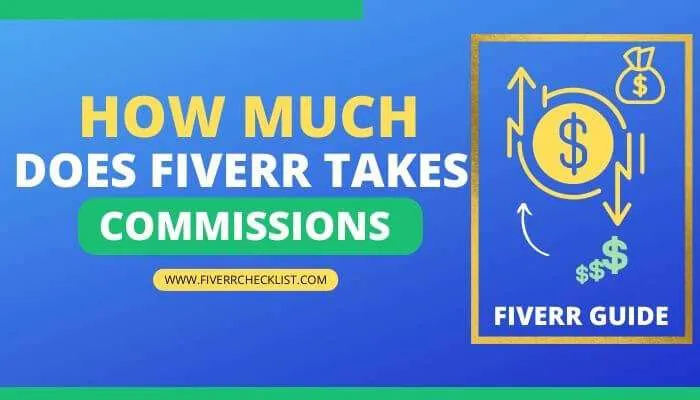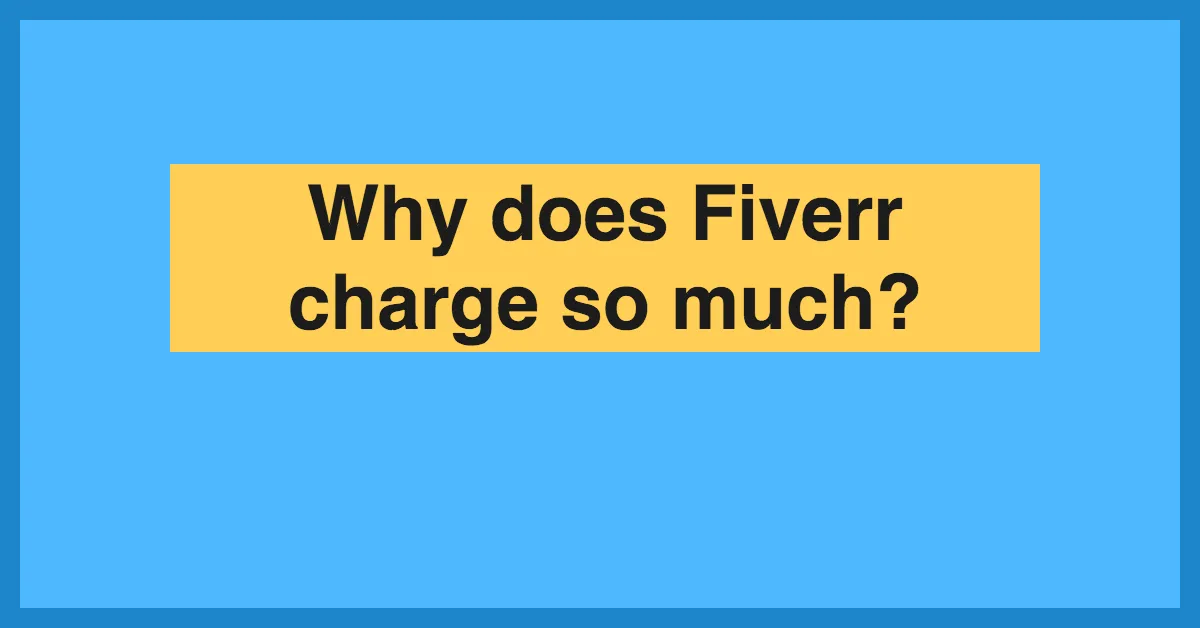Hey there! If you're a freelancer or a business owner looking to hire someone for a specific task, you might have crossed paths with Fiverr. Known for its diverse range of services, Fiverr has become a popular platform for many creative professionals. But if you’re wondering about the costs involved, you're not alone. In this post, we're diving deep into Fiverr's fee structure from 2018, so you can get a clear picture of how much they really take and what to expect while using the platform. Let's get started!
Understanding Fiverr's Fee Structure

Fiverr operates under a unique business model that can sometimes be a bit confusing, especially when it comes to fees. Here’s a straightforward breakdown of the fee structure that existed in 2018:
- Service Fees for Buyers: Buyers, who purchase gigs on Fiverr, were charged a 5% service fee on top of the cost of the gig. For example, if you bought a gig for $100, you would end up paying $105.
- Commission for Sellers: On the other hand, sellers or freelancers on the platform had to part with 20% of their earnings as a commission. So, if a seller completed a job for $100, they would receive only $80 after Fiverr took its cut.
- Withdrawal Fees: When it comes to getting your earnings out, there were also withdrawal fees to consider. Depending on the method (like PayPal or bank transfer), there might be additional costs incurred for accessing your money.
- Gig Extras: If a seller offered 'Gig Extras' (additional services for a fee), the same fee structure would apply to those extra charges as well.
Overall, it's crucial for both buyers and sellers to keep these fees in mind while navigating the platform. Understanding how Fiverr earns its revenue will not only help in managing your budget but also in setting realistic expectations for both service delivery and pricing.
Also Read This: How to Search for Fiverr Designers in the US
3. Fee Breakdown for Sellers

So, you're a seller on Fiverr, ready to turn your skills into cash, but how much of your hard-earned money actually goes to Fiverr? Let’s break it down.
When you create a gig on Fiverr, you set a price for the services you offer. However, Fiverr takes a percentage of this amount as a fee. As of 2018, this fee is 20% of your total earnings per order. That might sound steep, but it comes with benefits like a built-in audience and a platform to showcase your work.
To better illustrate this, let’s say you sell a gig for $100. Here's how the fee structure looks:
| Description | Amount |
|---|---|
| Total Sale Price | $100 |
| Fiverr Fee (20%) | -$20 |
| Your Earnings | $80 |
It's important to note that the commission is deducted after you complete the order but before you pull out your funds. Additionally, if you provide any add-ons or upgrades to your services, those will also be subject to the same 20% fee.
Another factor to consider is withdrawal fees. If you choose to withdraw your funds via PayPal, for instance, PayPal might charge its own fees for transactions. So, while Fiverr provides a great platform for buyers and sellers alike, it's always good to be aware of the costs involved.
Also Read This: Suggested Rate for a Freelance Web Developer
4. Fee Breakdown for Buyers

Now let’s turn our attention to the buyers! If you’re looking to purchase a gig on Fiverr, it’s not just the price of the service you need to consider. Fiverr has its own way of handling fees for buyers too.
As of 2018, when users purchase a service, they pay an additional service fee on top of the listed price of the gig. This fee varies based on the price of the gig:
- For projects costing up to $40, there’s a flat fee of $2.
- For projects ranging from $40.01 to $100, buyers will be charged $2.50.
- For gigs over $100, the fee increases to 5% of the total order price.
Here’s an example to illustrate how this works:
| Description | Amount for a Gig | Total with Fee |
|---|---|---|
| Gig Price | $50 | $50 + $2.50 = $52.50 |
As a buyer, it's crucial to be aware of these additional costs. While the prices for gigs may seem affordable at first glance, don’t forget to factor in this service fee. Doing so will give you a better understanding of your total expenditure while also helping you budget more effectively.
In conclusion, while Fiverr provides an accessible platform for both sellers and buyers, understanding its fee structure is vital for making informed decisions on the marketplace.
Also Read This: How to Make a Fiverr Pro Account
Comparison with Competitors
When you consider using Fiverr for your freelancing needs, it’s important to take a step back and look at how Fiverr’s fees stack up against those of its competitors. Many freelancers turn to platforms like Upwork, Freelancer, and PeoplePerHour for their gig economy needs. So, how does Fiverr hold up in this competitive landscape?
Here's a quick comparison:
| Platform | Service Fee | Withdrawal Fee | Minimum Deposit |
|---|---|---|---|
| Fiverr | 20% on earnings | None | None |
| Upwork | 20% on the first $500 10% on earnings between $500.01 - $10k 5% on earnings over $10k |
Varies | $1 |
| Freelancer | 10% on fixed-price projects | $0.3 per transaction | $5 |
| PeoplePerHour | 20% on the first $1k earned 7.5% between $1k - $5k 3.5% for over $5k |
None | $10 |
As you can see from the table, Fiverr's flat 20% fee might seem steep compared to platforms like Freelancer; however, it’s essential to factor in the levels of service and support offered by each platform. Fiverr’s platform is designed for quick turnarounds and simpler transactions, providing a unique space for buyers and sellers alike.
Also Read This: What Happens If a User Doesn’t Respond to Fiverr Resolution?
Impact of Fiverr Fees on Earnings
Now, let’s talk about the real impact of these fees on your earnings. If you are making a living through Fiverr, it’s crucial to understand how those fees cut into your profits. The fees can significantly affect your take-home pay, and here’s why.
For instance, if you charge $100 for a gig, here's a quick breakdown:
- Total Earnings: $100
- Fiverr's Cut: $20 (20%)
- Your Earnings: $80
On the surface, this might seem straightforward, but consider the following:
- *Consistency Over Time: If you consistently sell gigs at a similar price point, those fees add up! After ten gigs, you'd be losing $200 to Fiverr.
- Price Adjustments: You might feel the need to increase your rates to compensate for Fiverr’s cut. This can sometimes deter potential buyers if they perceive your services as too expensive.
- Competing Sellers*: The market can be saturated with sellers offering similar services. You may find yourself in a race to the bottom, affecting your earning potential further.
Ultimately, understanding the impact of Fiverr’s fees can help you strategize your services better, charge appropriately, and ultimately maximize your earnings. It’s vital to keep these factors in mind as you kick off your freelancing journey on Fiverr or any other platform!
Also Read This: How Much Money Can You Withdraw from Fiverr?
7. How to Maximize Earnings on Fiverr
If you want to boost your income on Fiverr, there are several strategies you can employ. It's about more than just offering services—it's about positioning yourself effectively and ensuring your gigs stand out. Here’s how you can maximize your earnings:
- Create Attractive Gig Packages: Offer multiple packages for your services—basic, standard, and premium. This way, clients can choose an option that suits their budget while you have more opportunities to upsell.
- Optimize Your Gig Title and Description: Use keywords that potential buyers might search for. Your title should be catchy yet descriptive, and the description must clearly state what services you provide, why you're the best choice, and how clients can benefit from your work.
- Leverage Video Introductions: Adding a video to your gig can enhance your appeal. A short, engaging video explaining your services or showcasing your work can help build trust with potential buyers.
- Offer Excellent Customer Service: Being responsive and polite can lead to repeat customers. Aim to respond to inquiries quickly, and always ask for feedback to improve your offerings.
- Promote Your Gigs Outside of Fiverr: Don’t rely solely on Fiverr’s internal traffic. Use social media and professional networks to promote your gigs. Platforms like Facebook, Twitter, and LinkedIn can bring additional visibility.
- Stay Current and Adapt: Trends change, and so do buyer needs. Keep an eye on what’s popular within your niche and adjust your offerings accordingly.
- Set Competitive Prices: Research what other sellers in your category are charging. Pricing your services competitively can help you attract more customers, especially when you’re just starting.
8. Conclusion
In wrapping up our detailed look into Fiverr fees from 2018, it's essential to remember that while Fiverr does take a portion of your earnings, the platform provides significant exposure to potential clients around the globe. The commission structure is pretty standard for freelance platforms, but the opportunities available can outweigh the costs if you approach your gigs strategically.
Ultimately, success on Fiverr isn't just about how much you can earn per gig; it's about building a brand and a portfolio that will draw customers in over time. By employing the strategies discussed, you have the potential to significantly increase your earnings while delivering valuable services to your clients.
So, whether you're just starting or looking to refine your existing gigs, understanding these dynamics can make all the difference. Good luck and happy freelancing!



